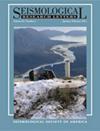三维动态破裂模拟的等效近场角频率分析揭示了动态源效应
IF 3.2
3区 地球科学
Q2 GEOCHEMISTRY & GEOPHYSICS
引用次数: 0
摘要
动态破裂模拟产生的合成波形考虑了非线性源和路径的复杂性。在这里,我们以一种新颖的方式分析了来自三维动态破裂模拟的数百万个空间密集波形,以阐明地震物理的频谱指纹。我们定义了一个brune型等效近场角频率(fc)来分析地震动谱的空间变异性,揭示其与源复杂性的关系。我们首先研究了一个简单的三维走滑设置,包括一个粗糙体和一个屏障,并说明了源属性和fc变化之间的基本关系。接下来,我们分析了三次高分辨率动态破裂模拟真实地震产生的超过1300万个合成近场强震波形,这些地震分别是2019年mw7.1里脊主震、mw6.4 Searles Valley前震和1992年mw7.3兰德斯地震。所有场景都考虑了三维断层几何形状、地形、断层外塑性、粘弹性衰减和三维速度结构,解析频率高达1-2 Hz。我们的分析揭示了fc升高的明显和局部模式,特别是在垂直部分。我们用观测到的近断层光谱验证了这种fc变异性。利用等时线分析,我们确定了复杂的动力学机制,解释了升高的fc射线,并导致了意想不到的脉冲、局部、垂直地面运动。尽管高垂直频率也与路径效应、破裂指向性和多个破裂锋面的合并有关,但我们发现它们主要是由断层非均质性或几何复杂性导致的斜坡旋转地表破碎破裂锋面减速引起的。我们的研究结果强调了空间密集的地面运动观测的潜力,可以直接从近场数据进一步了解地震物理。观察到的近场fc变化可以告诉我们指向性、地表破裂和滑动分割。基于物理的模型可以识别“要寻找什么”,例如,在潜在的大量近场大阵列或分布式声学传感数据中。本文章由计算机程序翻译,如有差异,请以英文原文为准。
Equivalent Near-Field Corner Frequency Analysis of 3D Dynamic Rupture Simulations Reveals Dynamic Source Effects
Dynamic rupture simulations generate synthetic waveforms that account for nonlinear source and path complexity. Here, we analyze millions of spatially dense waveforms from 3D dynamic rupture simulations in a novel way to illuminate the spectral fingerprints of earthquake physics. We define a Brune-type equivalent near-field corner frequency (fc) to analyze the spatial variability of ground-motion spectra and unravel their link to source complexity. We first investigate a simple 3D strike-slip setup, including an asperity and a barrier, and illustrate basic relations between source properties and fc variations. Next, we analyze >13,000,000 synthetic near-field strong-motion waveforms generated in three high-resolution dynamic rupture simulations of real earthquakes, the 2019 Mw 7.1 Ridgecrest mainshock, the Mw 6.4 Searles Valley foreshock, and the 1992 Mw 7.3 Landers earthquake. All scenarios consider 3D fault geometries, topography, off-fault plasticity, viscoelastic attenuation, and 3D velocity structure and resolve frequencies up to 1–2 Hz. Our analysis reveals pronounced and localized patterns of elevated fc, specifically in the vertical components. We validate such fc variability with observed near-fault spectra. Using isochrone analysis, we identify the complex dynamic mechanisms that explain rays of elevated fc and cause unexpectedly impulsive, localized, vertical ground motions. Although the high vertical frequencies are also associated with path effects, rupture directivity, and coalescence of multiple rupture fronts, we show that they are dominantly caused by rake-rotated surface-breaking rupture fronts that decelerate due to fault heterogeneities or geometric complexity. Our findings highlight the potential of spatially dense ground-motion observations to further our understanding of earthquake physics directly from near-field data. Observed near-field fc variability may inform on directivity, surface rupture, and slip segmentation. Physics-based models can identify “what to look for,” for example, in the potentially vast amount of near-field large array or distributed acoustic sensing data.
求助全文
通过发布文献求助,成功后即可免费获取论文全文。
去求助
来源期刊

Seismological Research Letters
地学-地球化学与地球物理
CiteScore
6.60
自引率
12.10%
发文量
239
审稿时长
3 months
期刊介绍:
Information not localized
 求助内容:
求助内容: 应助结果提醒方式:
应助结果提醒方式:


